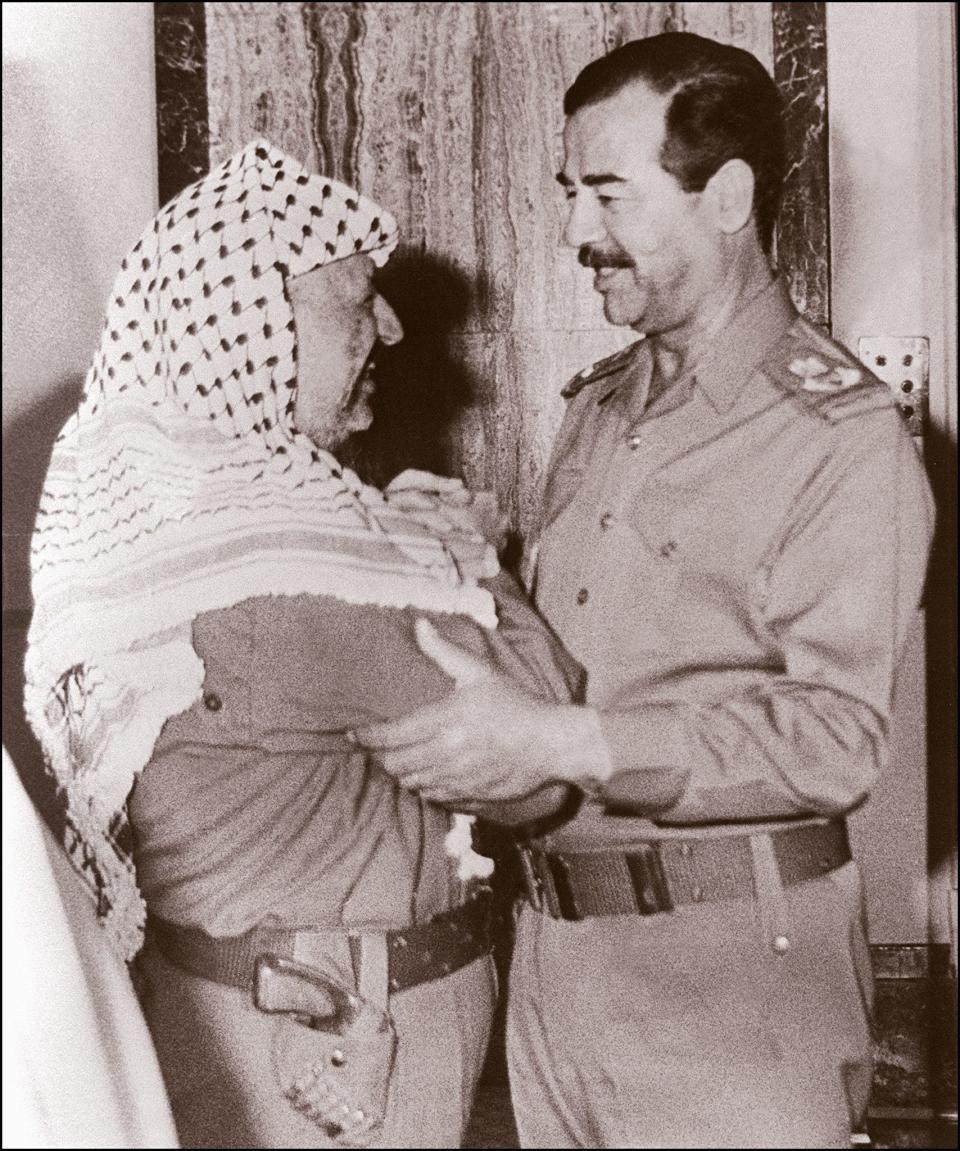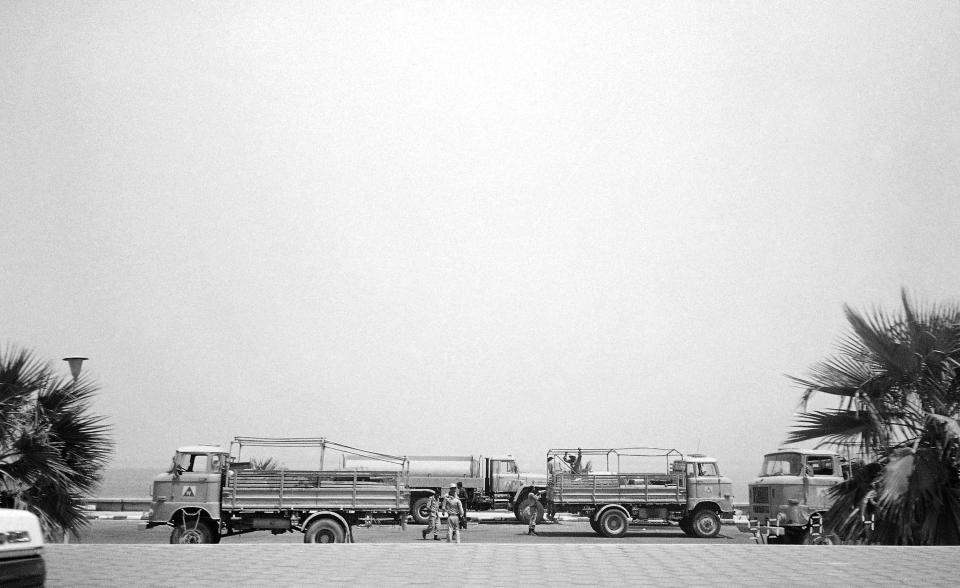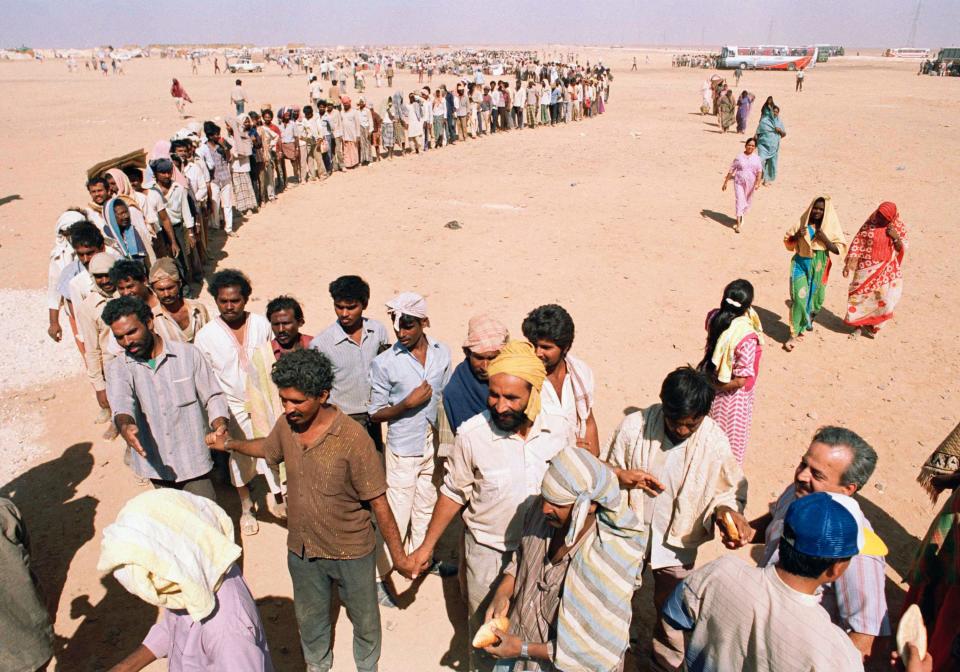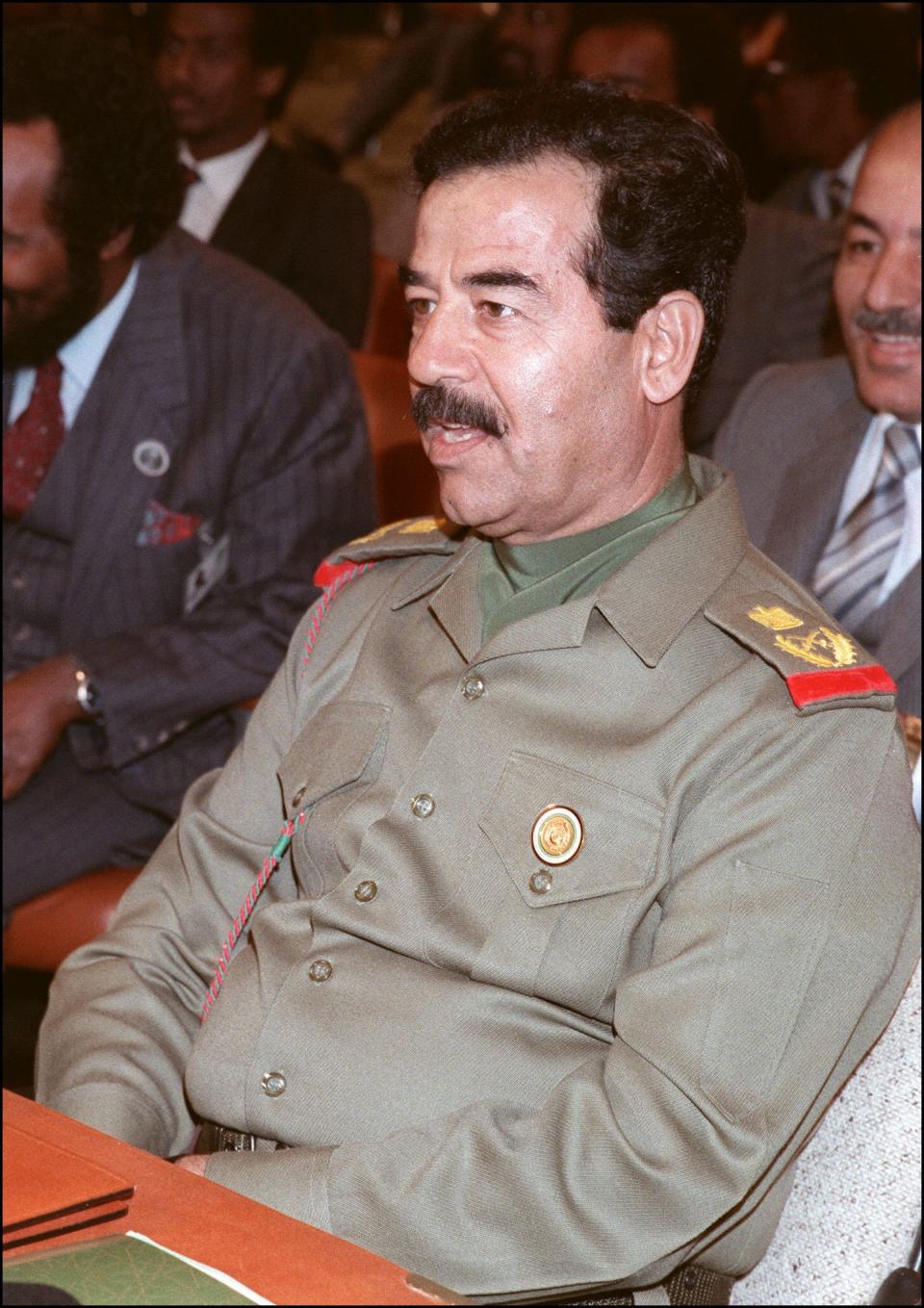From the archives | Ruthless reach for power: Dictator has a long history of violence
This story originally published on Aug. 3, 1990. It is being republished as part of the commemoration of USA TODAY's 40th anniversary on Sept. 15, 2022.

The "butcher of Baghdad,'' by bullying his way into tiny Kuwait, proved his ruthlessness knows no boundaries.
Saddam Hussein, the Iraqi president who pledged to "scorch half of Israel'' with poison gas, who once shot a colleague point-blank at a Cabinet meeting, who obliterated whole villages of ethnic Kurds, is on the warpath.
Rolling tank divisions into Kuwait City Thursday, he shattered alliances in the Mideast, sent oil prices soaring and made a mockery of world diplomacy.
"You're talking about something that could totally unravel the whole Mideast,'' says Sen. Patrick Leahy, D-Vt. "Talk about the analogy of a fuse being lit. It's being lit in Kuwait.''
That fuse exploded into Mideast politics, where Arab League foreign ministers were silent, unsure whether to risk Saddam's wrath by defending their brothers in Kuwait.
It burned its way through Europe and Japan, where concern about oil prices vied with fears of regional violence. And it drew the United States and Soviet Union together, with both deploring Saddam's actions.
But Saddam has already made his point: He is willing to use his imposing military might – and his iron will – to hold the world hostage.
"He is establishing his credentials as the power in Mideast politics,'' says Bernard Reich of George Washington University. "He reminds everybody that he is the 800-pound gorilla with a million-man army. You don't say no to an 800-pound gorilla.''
But the world tried in several ways to say no:
The United Nations Security Council called for Iraq's immediate withdrawal.
The West prepared an economic blockade, trying to extract a heavy price from a country dependent on imports.
Secretary of State James Baker is to join Soviet Foreign Minister Eduard Shevardnadze in Moscow today in an unprecedented joint condemnation of the invasion.
"This is the first test of the post-Cold War era,'' says Barry Rubin of the Washington Institute for Near East Policy. "Iraq has just broken all the rules.''
Breaking rules is nothing new for 53-year-old Saddam.
The son of a peasant, he committed his first murder at 14. At 20, he joined the then-underground Baath Party.
His tough ambition and leadership qualities won him appointment to a Baath team assigned to assassinate Iraq's then-ruler. But the attempt failed and a wounded Saddam fled across the desert to Syria and then Egypt.
Saddam rose to power in 1968 as the enforcer behind a bloody coup and took full control of the government in 1979.
Saddam often has been the target of international criticism, which he rarely heeds.
Just last week, he flouted that disregard when he told Egypt's Hosni Mubarak and U.S. Ambassador April Glaspie that he was only massing 100,000 troops on Kuwait's border, not planning to invade.

Saddam "has shown himself to be a ruthless leader willing to take on people who have been his allies,'' says Joseph Szyliowicz, Mideast expert at the University of Denver.
Often compared to Romania's Nicolae Ceausescu – Friday a British newspaper called him an "Arab Hitler'' – Saddam used poison gas to decimate entire lands populated by the Kurds on the Turkish border. The reason: They supported Tehran in his war with Iran.
"I cried when I saw the dead trees, the dry springs,'' Hussain Sinjari, a Kurdish rebel, told The Wall Street Journal. "You can say that the people were traitors, but what did the birds do, or the fruit trees?''
Saddam has shown his stomach for violence many times:
In April, he threatened to destroy half of Israel with chemical weapons if it attacked his country.
In March, he ordered the execution of Iranian-born, London journalist Farzad Bazoft, who tried to gather information about a massive explosion at a military complex.
Amnesty International this year said eight teen-agers were held for more than 15 months and horribly tortured for political reasons.
When an Iranian-backed Shiite organization was formed to disrupt his rule, he executed about 600 members in 1984.
His legacy of blood reached its height during the eight-year war with Iran.
A Sunni Muslim ruling a nation that is largely Shiite, Saddam arrested 90 members of a prominent Shiite family - ages 9 to 76 - after one of them made anti-Iraq broadcasts from Iran.
When the broadcasts continued, he killed six members of the family in front of the rest.
"Saddam is worse than Ceausescu,'' Bayan al-Hakim, a member of the family who fled to London, told the Journal.
"If he ever falls into the hands of the people, there won't be film of his corpse like the Romanians showed, because there won't be a fingernail left to photograph.''

With his picture on the front page of every newspaper, and his praises sung in children's nursery rhymes, Saddam cultivates an image as "the knight of the Arab nation.''
But Sen. Claiborne Pell, D-R.I., calls him "the Adolf Hitler of the Middle East.''
And Sen. Christopher Dodd, D-Conn. says, "You're dealing with a madman here.''
Given his reputation, the fear – whispered in political circles Thursday – is that his next target is Saudi Arabia.
That nation, with the world's largest oil reserves, is now enticingly close to Saddam's forces in Kuwait.
"There is 250 miles of open, flat terrain between Kuwait and Saudi Arabia,'' says Sen. David Boren, D-Okla. "It would be like living in Oklahoma and hearing that Dallas-Fort Worth had been occupied.''
Martin Indyk, executive director of the Washington Institute for Near East Policy, no longer dismisses the possibility.
"The important thing is that we should no longer be hoping for the best case, we should be planning for the worst,'' he says. "If Saddam goes into Saudi Arabia, he can capture 35% of the world's oil reserves in five days.''

The world, for now, is drawing the line at the bottom line, planning an economic squeeze against a country in debt to many nations and eager to rebuild a war-ravaged economy.
"The guy is vulnerable,'' says Indyk. "He depends on imports of food. He is deeply in debt. He cannot buy the things he needs for his population without Western credit.''
The blockade could force Saddam to withdraw – or at least pull back to the line of the disputed border.
Or it could fail if some countries looking to make a quick profit sell to an economically ostracized Saddam.
"We have to lean on a lot of people – including Brazil and other countries that supply him with high technology,'' says Rep. Tom Lantos, D- Calif.
"You cannot appease a blood-thirsty dictator.''
Not that the world hasn't tried.
The invasion "follows a decade of appeasement by the West,'' says Peter Galbraith, security aide to Pell. "His use of chemical weapons, which violates the 1925 Geneva accords, his grotesque human rights violations, his initiating the Iran-Iraq War – it all led to inevitable consequences.''
Now he controls Kuwait, a small nation whose U.S. ambassador, Nasir Al- Sabah – with tears in his eyes – pleaded to anyone who would listen, even Israel, to come to its aid.
"Unless we can stand together as friends to protect ourselves and to protect the innocence of our countries,'' he said, "we can no longer hope for peaceful coexistence and stability around the world.''
This article originally appeared on USA TODAY: Saddam Hussein deemed 'madman' for Kuwait invasion

